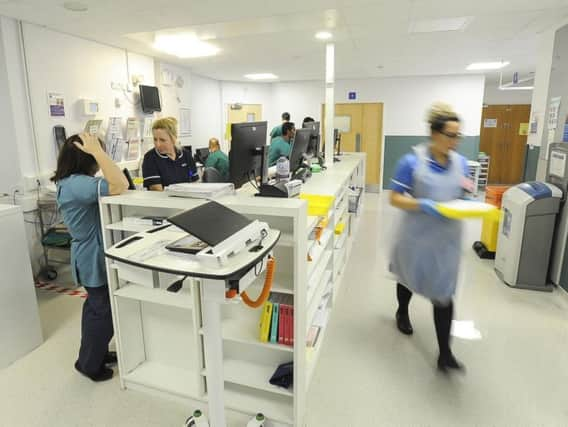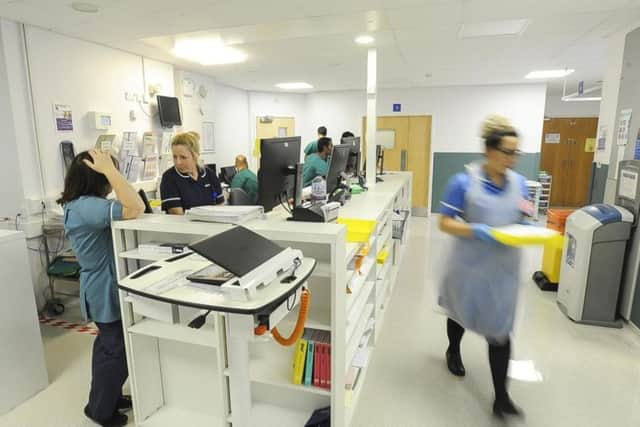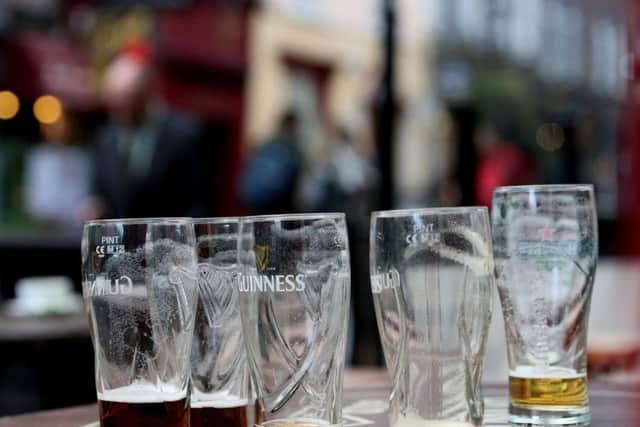Is Blackpool losing the war on booze as its hospital admissions top league?


It means the resort is still battling the bottle after years of topping national leagues of shame, though the number of alcoholics getting help from the NHS is also significantly higher than the national average.
Dr Nick Harper, deputy medical director at the Blackpool Victoria Hospital, said booze has a “major impact on the services we provide”, and said chiefs were working with others to “encourage people to drink at levels that reduce the risk of harm”.
Advertisement
Hide AdAdvertisement
Hide AdHe said the North West had seen a “high” number of deaths from alcohol-related liver disease “often closely associated with social deprivation”, and added: “Unfortunately, Blackpool has some of the most deprived areas in the country and alcohol-related liver disease is a significant issue.


“It is a common cause for admission to the emergency department and for attendance at acute areas of Blackpool Victoria Hospital, and the fact the report says Blackpool has the highest hospital admission rate in the country is obviously a cause for concern.”
For every 100,000 people living in the resort, 1,100 had a stay in hospital in 2017/18 because of drink, an NHS report out yesterday said.
That number is higher than anywhere else in England and Wales but it will not come as a surprise to health chiefs, who have spent years trying to tackle the multiple problems associated with alcohol abuse.
Advertisement
Hide AdAdvertisement
Hide Ad“There can be no doubt that tackling alcohol-related harm is currently a priority both nationally and locally,” the council’s alcohol strategy, dated to 2019, said.


“Alcohol misuse in the North West... is the worst in the UK, and Blackpool has high levels of alcohol-related harm – health, disorder, violence – for the size of the population.”
Men living in Blackpool generally die around 13 years earlier than the national average, while women die an average of eight years earlier.
The strategy adds: “One of the main causes of shorter life expectancy in Blackpool is alcohol-related diseases.”
Advertisement
Hide AdAdvertisement
Hide AdAlcohol causes and adds to numerous health issues, including liver and kidney disease, cancer of the mouth and throat, liver, larynx, colon and breast, pancreatitis, heart disease, high blood pressure, depression, and stroke.
It also has an impact on family life and society in general. Around four in 10 of all domestic violence cases stem from alcoholism, while, nationally, more than 100 children called the charity help line Childline every week, upset about their parents’ alcohol and drug use.
In Blackpool, booze has been linked to the deaths of two babies in recent years, while drinking was said to be a factor in more than a third of child abuse cases in England.
“Alcohol is too often a precursor and catalyst for crime and disorder in Blackpool, in addition to creating health and safety issues in the wider community,” the strategy added.
Advertisement
Hide AdAdvertisement
Hide Ad“There is a correlation between Blackpool’s areas of deprivation and hotspots for violent crime, domestic abuse, and criminal damage, all associated with alcohol abuse to some degree.
“Visitors to Blackpool swell the local population significantly during summer months, and although they make a huge contribution to the local economy, including a substantial ‘night time economy’, they also contribute to the local crime statistics as victims or offenders.
“This ‘tourism effect’ does have negative impact on crime and disorder statistics.”
Dr Arif Rajpura, Blackpool Council’s director of Public Health today called for minimum unit pricing to be introduced in pubs.
Advertisement
Hide AdAdvertisement
Hide AdHe said: “Although Blackpool does currently experience higher rates of alcohol-related hospital admissions compared to the England average, we have seen a gradual reduction in alcohol-related hospital admissions from 1229 per 100,000 in 2013/14 down to 1097 per 100,000 in 17/18. There have been a wide range of actions by partners across Blackpool over this period to drive down alcohol-related harm, and we do recognise that we need to continue the good work of partners across the town to continue this downward trend.
“To address the alcohol-related hospital admissions it is important that a number of evidence based strategies are employed in terms of; effective prevention; health improvement interventions for those at risk; treatment and recovery services for dependent drinkers; and action to reduce binge drinking and the harms associated with it. The Blackpool Alcohol Strategy addresses all of these approaches, but whilst the availability of cheap alcohol in supermarkets and off-licences remains across Blackpool alcohol will continue to cause harm.
“We therefore urge the government to implement a Minimum Unit Price (MUP) nationally which would reduce alcohol harm.”
The danger to children
Three years ago, the council launched a campaign warning of the dangers of drinking alcohol while looking after children, following recommendations in a report into the death of four-week-old Freddie Neil in 2014.
Advertisement
Hide AdAdvertisement
Hide AdThe baby’s parents, who faced no charges, were unable to say how he came to be wedged between a bed and a wall at their resort home after spending the hours before his death drinking with friends, the report found.
Freddie’s father, Matthew Neil, later disputed several of the report’s findings, saying he believed he moved his son from a Moses basket into his brother’s room while in an epilepsy-triggered fugue state, which he said saw him black out and “wake up” elsewhere suffering from amnesia.
Last February, six-month-old Rhys Jones suffocated on his parents’ bed in South Shore after his father fell asleep at his side after a night of drinking and taking drugs.
No charges were brought against dad Christopher Jones, or his mum Nicola, with police saying the pair were “very open and honest” during an investigation.
Highest alcohol-related trips to hospital
Advertisement
Hide AdAdvertisement
Hide AdWhen it came to hospital admissions primarily caused by alcohol, Blackpool had the highest rate in England and Wales, at 1,100 per 100,000 population.
The figure was down from just under 1,200 in 2015/16. Wokingham had the lowest rate at 390.
Nationally in 2017/18, there were an estimated 338,000 stays in hospital where the main reason for admission was put down to booze.
That’s a similar figure to 2016/17 but 15 per cent higher than in 2007/08.
Advertisement
Hide AdAdvertisement
Hide AdIt represents around 2.1 per cent of all admissions, which has changed little in the past decade. It 2007/08, it was 2.3 per cent.
The number of admissions rises with age up until the 55-64 age group, and then falls. Some 69 per cent of patients were over 45.
More men than women are admitted, with 61 per cent being male, and almost a quarter of all admissions were for cancer.
Some 23 per cent were for “unintentional injuries”.
More people getting help
Just over 800 prescriptions for alcoholism were given out per 100,000 population in Blackpool in 2017, the latest figures showed.
Advertisement
Hide AdAdvertisement
Hide AdThat’s one of the highest rates in the country, and well higher than the national average of 305.
The data, released by the NHS, are split into clinical commissioning group (CCG) areas. CCGs are responsible for organising and paying for health care for people on their patch.
Prescription rates for Fylde and Wyre CCG were 192, for Greater Preston 191, for Chorley and South Ribble 197, and for Lancashire North 300.
The treatment available includes drugs to reduce cravings and discourage drinking by causing unpleasant reactions – liking vomiting – if the patient consumes alcohol.
Advertisement
Hide AdAdvertisement
Hide AdBlackpool GP Dr Neil Hartley-Smith said: “There is clear evidence that alcohol misuse damages health.
“It is well known that alcohol affects liver function but it can also increase the risk of heart disease and stroke along with an increased risk of certain cancers including mouth, throat, stomach, liver and breast cancer.
“Add in to these physical problems the toll it places on our mental health, increasing the risk of depression and suicide.
“Alcohol-related problems do also add additional strain on the finite resources of the NHS locally and nationally and so for physical, mental and financial reasons it is important to encourage patients to seek help if they feel they might be a problem drinker.
Advertisement
Hide AdAdvertisement
Hide Ad“Treatments for alcohol addiction are available locally from specialist teams and are very effective if the patient is motivated to change their behaviour.
“The treatment plan needs to be tailored to the individual.”